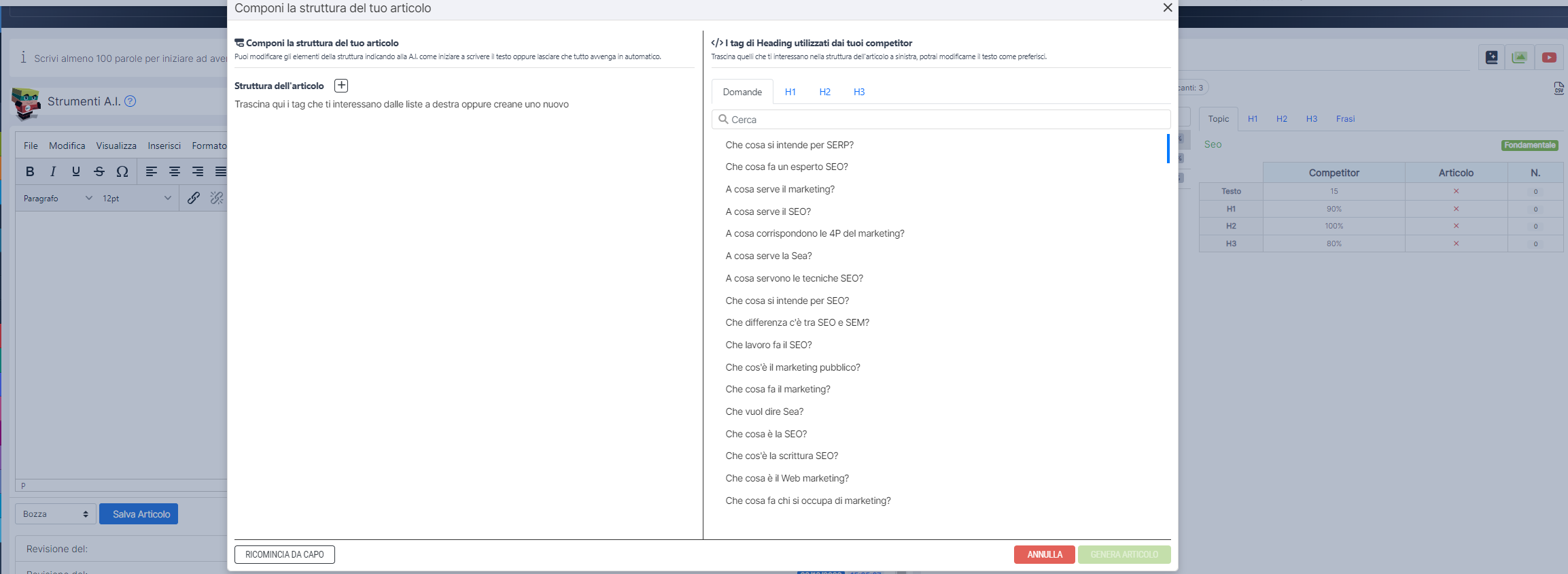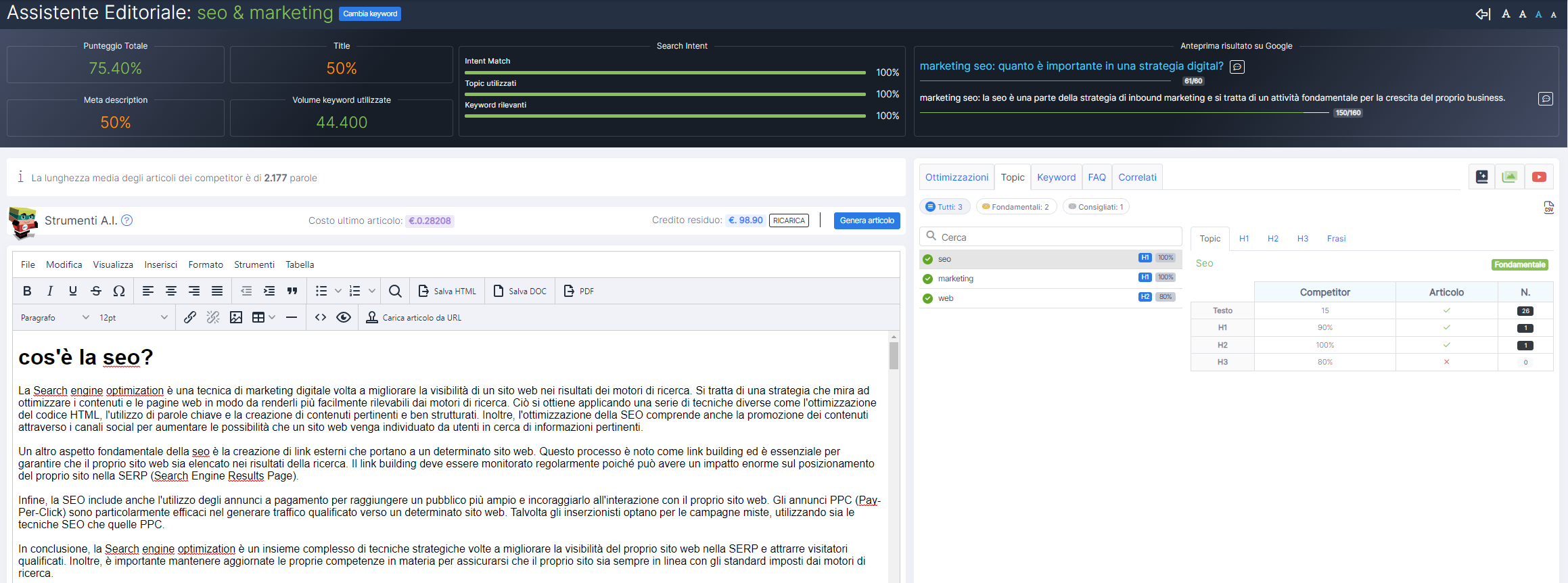Our Editorial Assistant evolves: here comes the AI applied to SEO
All the advantages and practicality of Artificial Intelligence combined with the information and effectiveness of our Editorial Assistant: from today, SEOZoom allows its users to use the potential of the most powerful AI systems based on GPT-3 (and soon GPT-4) to support the creation of texts optimized according to SEO best practices, thanks to the data of our suite. A necessary premise: this feature is a great tool that simplifies the task of writing and saves hours of work, but it should always be used in a conscious and “guided” way, both for practical and ethical issues.
The new feature for automated SEO text writing
Included in all our plans and available within both the Editorial Assistant and Editorial Plan (Editor mode), the article generation feature using Artificial Intelligence is based on the GPT-3 language model, which is already capable of producing text similar to natural human language, with the added value provided by the suite’s data, which allows content to be directed toward the satisfaction of users’ search intent.
What this means, in a nutshell, is that with SEOZoom, it is now possible to provide an SEO-oriented canvas for artificial intelligence to launch text generation through an SEO analysis done in real time on the content of competitors already positioned in SERP: in this way, the AI is guided to the drafting of a text that contains the topics and keywords that Google – and users – consider a priority in relation to the topic we are going to write about.
How to use the AI-driven text generation tool
In practice, content creation begins with setting up our target keyword and any secondary keywords we deem necessary to give depth to the article.In the text editor of the Editorial Assistant, we can then click on the “Generate Article” button and guide the AI in organizing the structure of the text.
In a simple and intuitive way, that is, we can decide how to compose the skeleton of the article, taking cues from the headings already used by competitors or from the frequently asked questions that users ask themselves on the web about the chosen topic, which will then become the paragraphs of our new content; in addition, we can also start writing the text ourselves, asking the AI to complete the work, or let everything happen automatically, and even set the tone of voice we prefer, before finalizing the process by launching the generation (with credits scaled up from our own wallet, which we can progressively top up).
Thanks to the integration between artificial intelligence and the algorithm developed by SEOZoom, the texts we compose in this way will be perfectly focused on the optimization goals, fully meeting the intents sought by Google and the technical parameters related to keyword usage and topics relevant to users, and likewise, many of the classic SEO optimization best practices will also already be met.
Ai and duplicate content: do the same inputs generate the same outputs?
The doubt that might assail at this point concerns the originality of the content created with this tool: assuming the use of the same keywords and headings, would the generated content actually be identical?
The answer is provided by our own Giuseppe Liguori, who concretely queried Artificial Intelligence by asking it to generate an answer to the question “If multiple people use the same kw will they end up with the same content?”. These are the results provided by the system:
Answer 1. “No, if multiple people use the same keywords, the tool generates unique content for each person. The tool uses advanced machine learning technology to make sure that no content is repeated. Also, the tool can adapt content to a variety of formats, so that even if two people are using the same keywords, their experiences will still be different.”
Answer 2. “No, it is a tool designed to allow its users to create unique content. Keywords are only part of the factors that influence the creation of unique content – content created with the tool also takes into account context, tone, and audience.”
In practice, AI has answered the question both directly and through field testing, and this also broadly applies to content.
Artificial intelligence and SEO: the proper use of the tool
This automatic text generation tool has exceptional practical value, because it allows you to create articles in no time and on any topic that are already SEO-oriented. The function is therefore a valuable support for finding insights on topics that we do not know or master perfectly, or for starting a work to which we then add the “human factor.”
In fact, there is an important premise to be made: we advise against simplistically publishing AI-generated texts both for practical and, so to speak, ethical issues, which affect both the work and the broader Web ecosystem.
First and foremost, a tool cannot and should not replace the professionalism of the copywriter, which also remains decisive in adding value to the content. An issue, this of the true “content creator“, to which even Google devotes a lot of attention: for instance, in the very recent update of the guidelines for quality raters (with the introduction of the experience element to EEAT) and with the Content Helpful system, in which it sanctions that content must be “written by people for people“.
At the same time, we cannot become “guilty” of littering (even more so) the Web with content over which we have no control, merely harnessing the power of AI to churn out infinite articles without any kind of criteria.
In fact, we should not overlook, going back to the more material aspects, the fact that the information retrieved and generated may not be precise, accurate or up-to-date (also due to “latency” of the AI system), and this would clearly affect the quality of the article, both on the news front and, especially, on sensitive topics such as health or vital information.
In short: text generation with AI is a tool and should be thought of and used as such, taking advantage of its incredible ability to speed up at full throttle the content writing phase, which can become insights to be enriched with our expertise, professionalism and personal experience, thus making the article really “useful” and SEO oriented.



